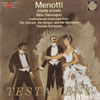Menotti Amelio al Ballo
Menotti’s light-hearted Amelia al ballo is well performed here but upstaged by his appealing Unicorn interludes
View record and artist detailsRecord and Artist Details
Composer or Director: Gian Carlo Menotti
Genre:
Opera
Label: Testament
Magazine Review Date: 1/2001
Media Format: CD or Download
Media Runtime: 61
Mastering:
Mono
ADD
Catalogue Number: SBT1179

Tracks:
| Composition | Artist Credit |
|---|---|
| Amelia al ballo |
Gian Carlo Menotti, Composer
Enrico Campi, Chief of Police, Bass Giacinto Prandelli, L'Amante, Tenor Gian Carlo Menotti, Composer Margherita Carosio, Amelia, Soprano Maria Amadini, L'Amica, Contralto (Female alto) Milan La Scala Chorus Milan La Scala Orchestra Nino Sanzogno, Conductor Rolando Panerai, Il Marito, Baritone Silvana Zanolli, First Maid, Mezzo soprano Silvia Mazzoni, Second Maid, Mezzo soprano |
| (The) Unicorn, the Gorgon and the Manticore |
Gian Carlo Menotti, Composer
Anthony Rolfe Johnson, Arbace, Tenor Astrid Varnay, Elektra, Soprano Barbara Frittoli, Elettra, Soprano Gian Carlo Menotti, Composer Instrumental Ensemble John Relyea, Oracle, Bass Lisa Milne, Ilia, Soprano Lorraine Hunt Lieberson, Idamante, Mezzo soprano Paul Charles Clarke, High Priest, Tenor Thomas Schippers, Conductor |
Author: Michael Oliver
Amelia al ballo (‘Amelia goes to the ball’) was Menotti’s first big success. Premiered in 1937, when the composer was 25, it had entered the repertory of the Metropolitan Opera and been produced in Italy and Sweden before he turned 30. This recording, based on a 1954 production at La Scala, Milan, uses Menotti’s original Italian libretto, which trips a lot more easily from the tongue than the English translation used at the premiere and at the Met, which makes it easier to accept the slight, anecdotal plot: Amelia wants to go to the ball but her husband won’t take her, suspecting (rightly) that she has a lover. Lover and husband settle down for a more or less amicable man-to-man chat, the exasperated Amelia fells her husband with a well-aimed vase, blames the lover and is at last taken to the ball by a courtly Chief of Police.
The music chatters along light-heartedly and garrulously, not without occasional dramatic ingenuity: one of the few moments of lyrical ardour in the piece accompanies a would-be poetic letter from the lover, but it is sung by the ‘wrong’ voice, the husband, who has found the letter and insists on reading it; Panerai, in splendid voice, does well by it. So does Carosio, in the more difficult task of portraying the self-centred ‘heroine’; her voice has a slight shrillness, but her light touch avoids Amelia seeming a mere shrew. Prandelli is good, too, but his one real solo is too brief and anonymous for much characterisation. Menotti is at his best in a scherzo-like trio which generates pleasant sub-Puccinian lyricism, and in a brief fugato that precedes the conclusion.
The six very short interludes from the ‘madrigal fable’The Unicorn, the Gorgon and the Manticore are nevertheless a considerable advance on the promising but slight one-acter. They have an archaising quality, prompted in this case by reference to Orazio Vecchi’s L’Amfiparnaso, that has often been one of Menotti’s strongest suits. Brightly scored for nine players, they would appeal to anyone who enjoys Reynaldo Hahn’s Le bal de Beatrice d’Este, which they closely resemble. Both recordings sound very well for their age.'
The music chatters along light-heartedly and garrulously, not without occasional dramatic ingenuity: one of the few moments of lyrical ardour in the piece accompanies a would-be poetic letter from the lover, but it is sung by the ‘wrong’ voice, the husband, who has found the letter and insists on reading it; Panerai, in splendid voice, does well by it. So does Carosio, in the more difficult task of portraying the self-centred ‘heroine’; her voice has a slight shrillness, but her light touch avoids Amelia seeming a mere shrew. Prandelli is good, too, but his one real solo is too brief and anonymous for much characterisation. Menotti is at his best in a scherzo-like trio which generates pleasant sub-Puccinian lyricism, and in a brief fugato that precedes the conclusion.
The six very short interludes from the ‘madrigal fable’
Discover the world's largest classical music catalogue with Presto Music.

Gramophone Digital Club
- Digital Edition
- Digital Archive
- Reviews Database
- Full website access
From £8.75 / month
Subscribe
Gramophone Full Club
- Print Edition
- Digital Edition
- Digital Archive
- Reviews Database
- Full website access
From £11.00 / month
Subscribe
If you are a library, university or other organisation that would be interested in an institutional subscription to Gramophone please click here for further information.




